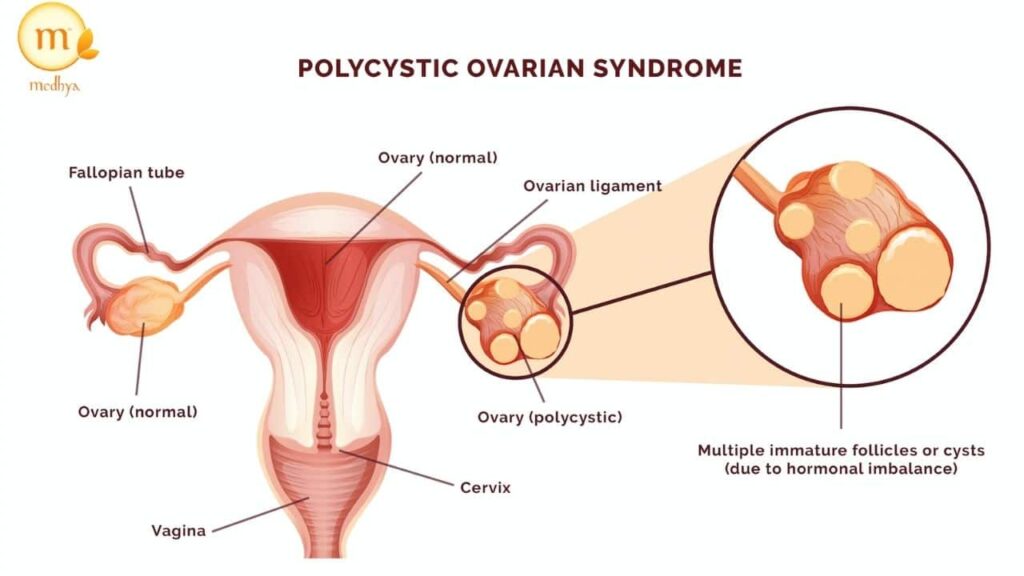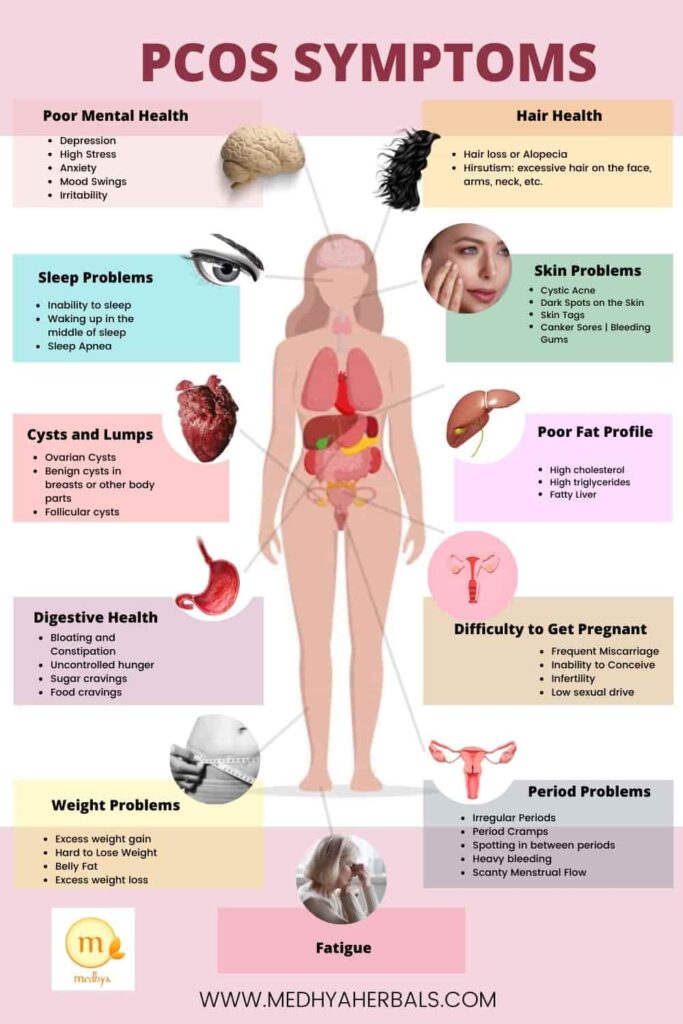PCOS Symptoms Test Quiz To Know if You Have PCOS | PCOD
Check whether your health symptoms indicate Polycystic Ovarian Syndrome with this 2 min PCOS Symptoms quiz. For each question, please check the option that's applicable for you. On completion, you will get your results and Ayurvedic diet & lifestyle guidelines to naturally find relief from PCOS Symptoms.
What tests are done to Diagnose PCOS?
There is no single test for PCOS. Usually, polycystic ovary syndrome diagnosis is based on thorough discussion with the patient to better understand their reproductive health and overall health.
Your doctor will conduct blood tests, physical examination, and ultrasound to check for the following:

- Your family history, which takes the genetic factors into account. It checks for the possibility of insulin resistance running in the family.
- Your diet and lifestyle, which would indicate possibility of insulin resistance, stress, or inflammation triggered PCOS.
- An ultrasound of the ovaries to check whether multiple cysts are present.
- Physical examination to observe visual symptoms that are related to PCOS. This will check for the health of reproductive organs, skin condition, hair, and other related features to PCOS.
- Blood tests to check for hormone level and possibility of high Androgens. This is one of the three criteria for formal diagnosis of PCOS.
How is PCOS Diagnosed?
Now coming to the formal diagnosis!
Once your doctor checks on the above points, he or she makes a PCOS Diagnosis. You need to meet any two of the three conditions given below:
1. Irregular Periods
It leads to irregular periods, missed periods, spotting in between periods, and sometimes very heavy periods with severe PMS.
Several hormonal imbalances can delay ovulation or prevent ovulation from happening at all. That’s why women with PCOS struggle with infertility and difficulty in getting pregnant with PCOS.
2. Excessive Androgens
Androgens are a set of hormones that are present in men in much higher proportion. That’s why, Androgens are termed as male sex hormones.
High androgen levels lead to growth of male pattern balding, hirustism or growth of facial hair, acne, and excessive belly fat.
3. More than 12 Cysts on the Ovaries
For women with PCOS, Cysts on the ovaries are actually immature follicles.
Since, ovulation is suppressed in PCOS, hence the egg often stays stuck in the follicle, giving it an appearance of a cyst.
In PCOS, it is common to see multiple such immature follicles on the ovaries. This often makes them enlarged and gives them a rough surface. This can be captured by a scan.
Now, if you have more than 12 cysts, then it indicates the possibility of PCOS.
However, it is quite common to see ovarian cysts in the teens, specifically in the early years after their menstrual cycle begins. Usually, these cysts are benign and go away once the menstrual cycle establishes.
At the same time, there are women in their late 30s or early 40s, who generally do not have cysts. Yet, they struggle with the symptoms, and hence diagnosed with PCOS
That is why, the appearance of cysts is not really an important criteria to diagnose PCOS.
Hence, the term Polycystic Ovarian Syndrome is quite misleading for a large majority of women.
PCOS Symptoms Checklist
PCOS presents itself in different ways in different women. You may experience one or more of the health symptoms listed below.
Also, the extent to which a health symptom is present in a women varies depending on her hormone imbalances.
For example, if you are experiencing high levels of Androgens or male hormones, then you will constantly struggle with Irregular periods, facial hair, acne, and hair loss on scalp.

Here's Polycystic ovary Symptoms Checklist for you to know whether you fall in the risk category of having PCOS.
- Difficulty to Get Pregnant
- Frequent Miscarriage
- Inability to Conceive
- Infertility
- Low sexual drive
- Cysts on the Ovaries
- Period Problems
- Irregular Periods
- Period Cramps
- Spotting in between periods
- Heavy bleeding
- Scanty Menstrual Flow
- Weight Problems
- Excess weight gain
- Belly Fat
- Excess weight loss
- Metabolic syndrome
- Skin Problems
- Acne
- Dark Spots on the Skin
- Skin Tags
- Hair Health
- Hair loss or Alopecia
- Excessive facial and body hair growth, known as hirsutism
- Poor Mental Health
- Depression and anxiety
- High Stress
- Mood Swings
- Irritability
- Fatigue
- Digestive Health
- Bloating and Constipation
- Uncontrolled hunger
- Sugar cravings
- Food cravings
- Poor Fat Profile
- Sleep Problems
- Inability to sleep
- Waking up in the middle of sleep
- Sleep Apnea
- Hormone Imbalances
- High Androgens
- High LH
- Low FSH
- Low Progesterone
- Estrogen Dominance
- Insulin resistance and High Insulin levels
- High Cortisol
The Symptoms of PCOS often overlap with other Health Issues
Polycystic ovary syndrome is one of the most common hormonal disorders. Studies indicate that nearly 1 in every 10 women of reproductive age struggle with PCOS.
It stands for Poly cystic Ovarian Syndrome. However, it is quite possible that you may not even have poly cystic ovaries. Yet, you may still be suffering from PCOS.
In fact, PCOS is not a disease. It is a cluster of health symptoms that present differently in different women.
That means, no two women with PCOS have exactly same symptoms!
Also, a number of symptoms often overlap with other hormonal imbalances or nutritional deficiencies such as:
- Vitamin D Deficiency
- Hypothyroidism or abnormal thyroid function
- Iodine Deficiency
- Protein Deficiency
- Excessive Toxin Build Up in the body
- After you stop taking the Birth Control Pills
- High levels of Prolactin Hormone
- Eating Disorders and Disturbed digestive fire
That is why, it is really difficult to diagnose PCOS at home!
However, PCOS symptoms quiz does help you to identify possibility of PCOS based on the most probable symptoms of PCOS.
Disclaimer: PCOS Quiz is based on PCOS symptoms, triggers, and signs of PCOS that are commonly observed in women with PCOS.
The purpose of PCOS Quiz is to provide you with the likelihood of poly cystic ovarian syndrome. For PCOS Diagnosis, you should consult your Doctor.
In case of unusual and serious health issues, you should contact your Doctor and take medical assistance. For Ayurvedic treatment, you can schedule online consultation with Dr. Pawan Bansal at Medhya Herbals.